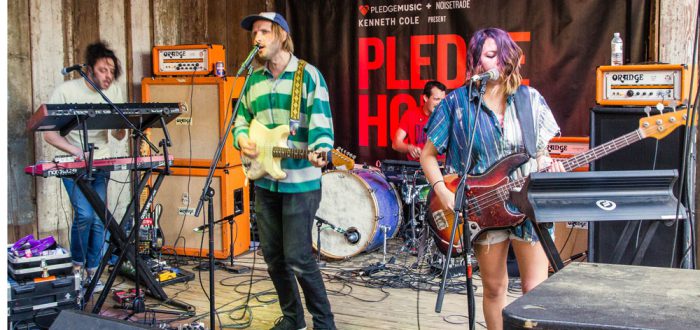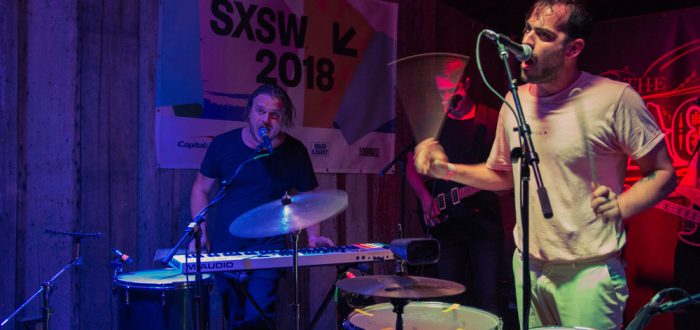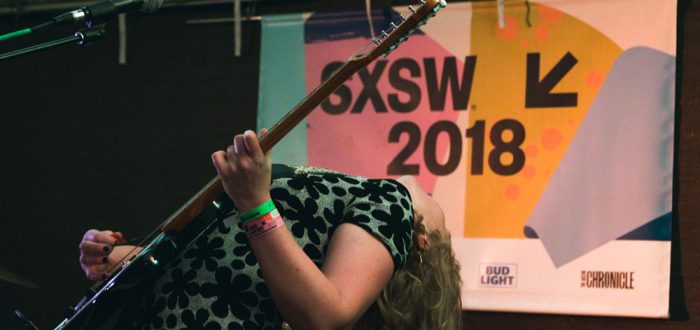Written and Photo by Nathaniel Torres
Sego, a Utah born and LA transplant band, was featured on NPR’s “The Austin 100″ and played their second official SXSW showcase this year. The band was founded by members Spencer Peterson and Thomas Carroll and has since expanded to include Alyssa Davey (bass) and Brandon McBride (synth and guitar). The band captures their audience by enveloping them in a groovy mirage. A sound I compare to a short-lived age of 90’s pop. A sort of mix between The Verve and Blur. Despite the older references, Sego stands on their own today while their crowds sing and dance to their tunes. If you needed any more convincing to take a listen just know the band’s cover of “Young Turks” was approved by Sir Rod Stewart himself.
How many SXSW have you attended/played?
Spencer: Second [as Sego]. We were here three years ago right after we started. Alyssa [bassist], this is her first time. She’s just getting acclimated to the noise.
Had you heard or known about SXSW before coming out?
Spencer: I’ve been here a bunch. I was coming with different bands for years. I’ve been to SXSW like 6 times maybe and it just continues to change every time I’m here.
Alyssa: I had always heard about SXSW. My dad actually was always pushing this other band I was in to go to SXSW. He was all about it.
Was it difficult getting an official showcase?
Spencer: It’s been relatively easy for us, in the past though. It’s interesting because you get one show and you are coming all this way for one show, but then within the month you end up picking up ten different showcases. As all these bands descend upon Austin there’s all this sifting and settling of the load. I feel like it’s hard because you have to put in some time, but once you’re kind of like in there, it really kind of pays off. You can find shows if you really push for it, even if you are not official. I’ve done SXSW [with different bands] three years in a row – not being official – and we played awesome huge shows. It was great.
How was your travel out here?
Spencer: We are trying to make a loop of it. A lot of out-of-state bands will try to make a route into and out of SXSW; which makes it tough touring in and out of SXSW because all of a sudden it means every band is routed on the same timeline and the same place.
Alyssa: I found that with a friend of mine; their band played here. They did the same thing and made a tour out of it. You’re already going out there so do some shows on the way and do some shows on the way back.
Spencer: It kind of creates a weird road culture where all these little towns that normally don’t get big bands are overwhelmed. All these bands need a place to play. Places most people haven’t heard of get decent shows leading up and coming away from SXSW. This place moves like a small little economy outside of Austin just because of so much cross traffic.
What are your feelings on the atmosphere? Were you well received?
Alyssa: The people here are into music because clearly they’re at a music festival but in a different way. It’s an appreciation. Here it’s a little different because you’re seeing so many bands that you don’t know that you’ve never heard of, so it’s like new ears every time.
Spencer: Yeah the whole attitude is different. It’s still cool.
Badges are quite expensive and the word is that artists do not really make a profit. What are your feelings on this?
Spencer: I think everybody treats it like a loss. I knew one band that actually made money on a show…and it blew my mind. We pay out just to get here, just get the opportunity. Personally, I go into it assuming that it’s just a wash. You can offset the loss a little bit by booking some shows in and out and making it more purposeful.
Does the festival open doors? What are the benefits of getting out here?
Spencer: Yeah and close some. Most people here are here with a purpose and have some industry clout. We had a crappy show and it turned cool people off on us. They were at that show and they were actually kind of high rollers. So, we learned the hard way you should never mail in a show, ever…especially at SXSW because you never know who’s out in the audience. It’s not like a random tour stop. Whether [it’s a] label or PR people, I feel like every time I’m out here I meet people I forge friendships with and relationships with.
What were some other things you got into while you were here?
Alyssa: Barbecue!
Spencer: I feel like I got to get some barbecue while we’re in town.
Will you be doing SXSW again or coming back our way sometime soon?
Alyssa: I hope.
Spencer: We have nothing in the books as of right now but I feel we come out here about every once a year, year and ha alf. So yeah, we’ll be back soon.
Sego is well on their way making the tour back home where the brisket is lacking. They are making sure to stop in their origin city of Provo, Utah where they say they always receive the warmest welcome. Sego’s music can be found on Spotify where you can also listen to their Audiotree Live set. They are also on social media if you’d like to give them a shout out. Just don’t expect it to compare to acknowledgment from Sir Stewart.




